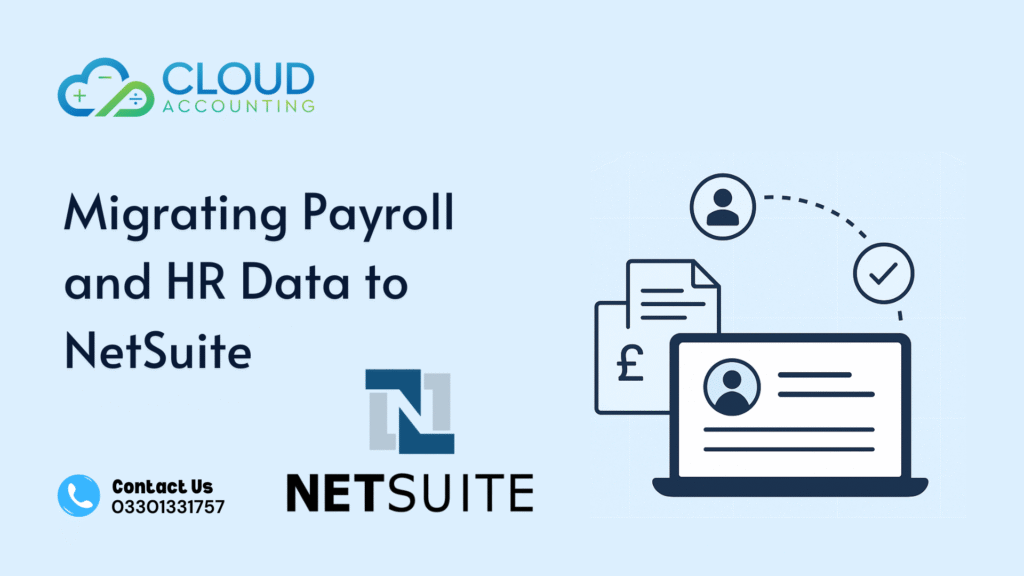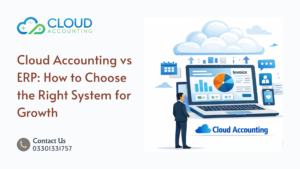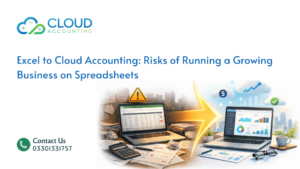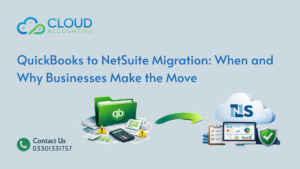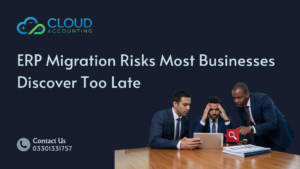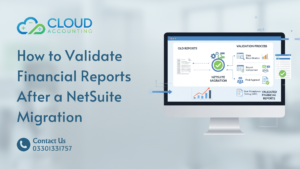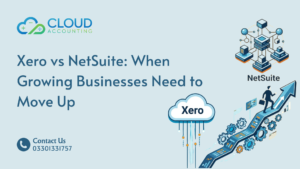Moving to NetSuite can transform how your business manages people, payroll, and compliance but only if your data makes the move cleanly. NetSuite HR Data Migration isn’t just about moving employee records from one system to another. It’s about preserving every crucial detail from salary history and leave balances to compliance documents without losing accuracy or context.
When payroll or HR data goes missing, even small gaps can lead to serious problems. Inaccurate payslips, missing tax records, or incomplete employee histories can cause compliance risks and damage trust within your organization. That’s why businesses shifting to NetSuite must handle HR and payroll migration with precision and structure.
In this guide, we’ll explain:
- What’s involved in NetSuite HR Data Migration
- How to prepare your payroll and employee data for the move
- Common challenges businesses face
- And how Cloud Accounting’s experts make the entire process secure, accurate, and compliant
Understanding NetSuite HR Data Migration
Unlike accounting migrations that mostly deal with numbers, NetSuite HR Data Migration involves a mix of structured and unstructured information — personal details, payroll calculations, performance records, and compliance data. Each type of data must be mapped correctly to NetSuite’s HR and payroll modules to avoid errors after migration.
Key Data Components Typically Migrated
When migrating to NetSuite, businesses usually transfer:
- Employee master records — names, addresses, contact information, hire dates, and job titles.
- Payroll data — pay rates, earnings, deductions, bonuses, benefits, and tax details.
- Leave and attendance records — vacation, sick leave, and accrued time balances.
- Performance and training data — appraisals, certifications, and skill records.
- Compliance documents — contracts, identification files, and tax forms (e.g., W-4, I-9, T4).
Why HR and Payroll Migration Is More Complex
NetSuite HR Data Migration demands extra care because human resource information changes frequently and carries strict privacy obligations. Unlike general ledger data, HR information can’t simply be exported and re-imported — it must be validated, anonymized where needed, and securely transferred under data protection laws.
That’s where a structured migration plan comes in — one that ensures accuracy, security, and compliance from start to finish.
Preparing for Your NetSuite HR Data Migration
Preparation is the foundation of a successful NetSuite HR Data Migration. Before any data is moved, your team needs to clean, organize, and validate what’s already in your current system. This prevents data loss, payroll mismatches, and compliance issues once you go live in NetSuite.
Here’s a clear pre-migration checklist:
1. Audit Your Existing HR and Payroll Data
Start by reviewing the quality of your employee and payroll information. Look for incomplete records, duplicate employees, or outdated pay codes. Correcting these issues early saves hours of troubleshooting later.
2. Identify What Needs to Move
Not all data needs to be migrated. Determine which datasets are essential for business continuity — typically employee master records, payroll details, leave balances, and tax histories. Archived or inactive records can often be stored separately.
3. Map Data Fields to NetSuite
Each piece of information — from employee names to deduction codes — must align with NetSuite’s field structure. Field mapping ensures that your source data flows correctly into NetSuite’s HR and payroll modules.
4. Secure Sensitive Information
HR and payroll files include personally identifiable information (PII). During NetSuite HR Data Migration, encryption and access controls are crucial to comply with privacy laws like GDPR, HIPAA, or local labor regulations.
5. Create a Backup and Validation Plan
Always keep a full backup of your current HR system before migration begins. You’ll also need a plan to validate migrated data against source records to ensure no information is lost or altered.
With this groundwork in place, you’re ready to move into the technical phase — transforming and importing your data into NetSuite.
How the NetSuite HR Data Migration Process Works
At Cloud Accounting, we follow a structured and transparent process to make NetSuite HR Data Migration smooth, accurate, and fully compliant. Our approach combines technical expertise with HR domain knowledge, ensuring your sensitive employee and payroll data is handled with care from start to finish.
Here’s how our 4-step migration process works:
Step 1: Assess & Plan
We start by analyzing your current HR and payroll systems — whether you’re using ADP, BambooHR, QuickBooks Payroll, or another platform. This assessment helps us identify data complexity, field structures, and potential issues early. Then we design a migration roadmap tailored to your business needs, including timelines, data scope, and validation steps.
Step 2: Prepare & Cleanse Data
Next, our team extracts your HR and payroll data and performs a detailed clean-up. We remove duplicates, standardize formats, and verify field consistency. Every dataset — from employee IDs to pay components — is prepared for smooth integration with NetSuite.
Step 3: Migrate & Validate
Using secure transfer tools and NetSuite’s import capabilities, we migrate your data in structured batches. After migration, we run detailed reconciliation checks to confirm accuracy between your source system and NetSuite. Payroll data, in particular, is tested through trial runs to ensure calculations match exactly.
Step 4: Verify & Support
Once your NetSuite HR Data Migration is complete, we validate every record and provide post-migration support. Our team works alongside your HR and payroll staff to ensure they’re confident using NetSuite’s modules. If adjustments are needed, we handle them promptly.
This systematic process ensures your migration is secure, compliant, and ready for real-time HR operations in NetSuite.
Common Challenges in NetSuite HR Data Migration
Even with careful planning, HR and payroll data migrations can encounter unexpected hurdles. The good news? Most issues can be avoided with the right preparation and expert guidance. Here are the most common challenges seen during NetSuite HR Data Migration — and how Cloud Accounting helps you navigate them.
1. Inconsistent Employee Data
When employee records are managed across multiple systems (like payroll, HR, and time tracking), inconsistencies are common. For example, job titles or department codes may differ between systems. We solve this by creating a unified data mapping plan that standardizes values before migration.
2. Missing Payroll Details
Old systems may store payroll history in formats that don’t match NetSuite’s structure. This can result in missing earnings or deduction data after import. Our specialists pre-validate each payroll file, converting values to the correct formats to ensure accurate reporting in NetSuite.
3. Security and Privacy Risks
Payroll data includes highly sensitive information — from salaries to tax IDs. During NetSuite HR Data Migration, we use encrypted transfer methods and restricted access protocols to protect your employee information in full compliance with GDPR and other data laws.
4. Integration Conflicts
If your HR or payroll tools are connected to third-party applications, migration can disrupt workflows. We assess all linked systems early and build connection bridges that maintain your integrations post-migration.
5. Limited Internal Expertise
HR and accounting teams are experts in people and finance, not migration scripting or NetSuite configuration. That’s where Cloud Accounting steps in — handling all technical tasks so your internal teams can focus on business continuity.
By anticipating these challenges, you reduce downtime and ensure a clean, compliant, and successful transition to NetSuite.
Best Practices for a Successful NetSuite HR Data Migration
Migrating HR and payroll data is one of the most sensitive projects your business can undertake. Every detail matters — from how files are exported to how they’re mapped and validated in NetSuite. Follow these best practices to make your NetSuite HR Data Migration as smooth and reliable as possible.
1. Start with Clean Data
Before you even touch NetSuite, invest time in cleaning up your existing HR and payroll records. Fix inconsistent job titles, outdated employee statuses, and incorrect tax IDs. Clean data not only reduces migration errors but also improves the accuracy of reports once you’re live in NetSuite.
2. Involve Key Stakeholders Early
HR, finance, and IT teams all play a role in NetSuite HR Data Migration. Bringing everyone in early ensures each department’s requirements — like payroll schedules or benefits configurations — are considered during setup.
3. Validate Throughout the Process
Don’t wait until the end to check your data. Validate employee and payroll records in small batches during test imports. This step-by-step verification helps catch mismatches or missing fields before they become major issues.
4. Protect Sensitive Data at Every Stage
Use encrypted files, limited access permissions, and secure cloud storage for all employee and payroll data. Always comply with data privacy regulations relevant to your region — whether it’s GDPR, HIPAA, or other labor laws.
5. Choose Experienced Migration Specialists
HR data isn’t something to experiment with. Partnering with experts who understand both HR systems and NetSuite ensures your migration is compliant and precise. At Cloud Accounting, our team has successfully completed numerous NetSuite HR Data Migration projects for growing businesses across multiple industries.
Following these best practices helps prevent costly mistakes, maintains compliance, and sets your HR and payroll systems up for long-term success inside NetSuite.
Why Choose Cloud Accounting for Your NetSuite HR Data Migration
When handling employee information and payroll records, accuracy and confidentiality aren’t optional — they’re essential. At Cloud Accounting, we specialize in NetSuite HR Data Migration, helping businesses securely transfer complex HR and payroll data without disruption.
Here’s why businesses across the UK and beyond choose us as their migration partner:
1. Certified NetSuite Specialists
Our migration consultants understand NetSuite’s HR and payroll architecture inside out. We map your data accurately and ensure every record — from salary history to compliance forms lands exactly where it belongs.
2. Proven HR & Payroll Expertise
We don’t just move data; we understand it. Our team has years of experience managing HR, payroll, and compliance data, so we know how to prevent reporting errors and configuration conflicts.
3. Secure & Compliant Process
Security is at the heart of every NetSuite HR Data Migration project. All files are encrypted, transferred via secure servers, and validated under strict data protection guidelines (GDPR, HIPAA, and local labor laws).
4. Customized Migration Strategy
No two businesses are the same. Whether you’re migrating from BambooHR, ADP, QuickBooks Payroll, or Excel, we design a strategy tailored to your data structure, HR policies, and timeline.
5. End-to-End Support
From planning to post-migration validation, our support continues until your HR and payroll teams are fully confident using NetSuite.
Migrating HR and payroll data doesn’t have to be stressful. With Cloud Accounting’s experts guiding the process, your business can transition to NetSuite confidently — knowing every employee record, tax detail, and payroll calculation has been handled with precision.
FAQs on NetSuite HR Data Migration
1. What is NetSuite HR Data Migration?
NetSuite HR Data Migration is the process of transferring all HR, payroll, and employee-related data from your old system into NetSuite. This includes employee profiles, pay history, tax records, and compliance documents.
2. How long does a NetSuite HR Data Migration take?
The timeline depends on your data volume and source systems. Smaller migrations may take a few days, while complex HR and payroll migrations for larger companies can take several weeks to complete properly.
3. What systems can Cloud Accounting migrate from?
We handle migrations from ADP, BambooHR, QuickBooks Payroll, Paychex, Excel, and other HR/payroll platforms to NetSuite. Each project includes full mapping, testing, and validation.
4. Is employee data secure during migration?
Absolutely. All data is transferred through encrypted channels, stored in secure environments, and handled according to GDPR and other global data protection standards.
5. Do I need to clean my data before migrating to NetSuite?
Yes — clean, validated data ensures a smoother migration. Cloud Accounting helps you identify and fix data issues before transferring to NetSuite, saving time and preventing errors.
6. Can Cloud Accounting customize HR workflows in NetSuite after migration?
Yes. Our specialists not only handle the migration but also help you configure HR and payroll workflows, permissions, and reporting structures within NetSuite.
7. How do I get started with a NetSuite HR Data Migration?
Simply contact our migration team for an initial consultation. We’ll review your current systems, outline a tailored plan, and provide a clear timeline and quote.
Get Expert Help with Your NetSuite HR Data Migration
Migrating HR and payroll data to NetSuite is a big step — but you don’t have to handle it alone. At Cloud Accounting, our team of NetSuite-certified experts ensures your employee records, payroll histories, and compliance data migrate securely, accurately, and without disruption.
We’ve helped businesses across the UK and beyond move their HR and payroll systems to NetSuite with complete confidence. Whether you’re switching from ADP, BambooHR, or QuickBooks Payroll, we tailor every migration to your business needs.
Here’s what you can expect when working with us:
- A structured, end-to-end NetSuite HR Data Migration plan
- Data handled securely under GDPR and global privacy laws
- Validation reports to confirm 100% accuracy
- Dedicated post-migration support and training
Ready to Move Your HR and Payroll Data to NetSuite?
Let’s make your migration secure, accurate, and compliant. Book your free consultation today or request a custom NetSuite HR Data Migration quote below.

